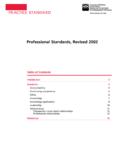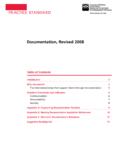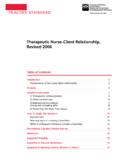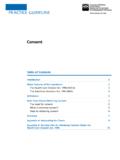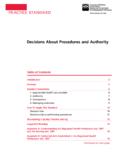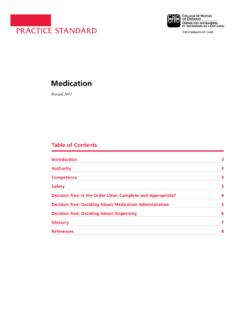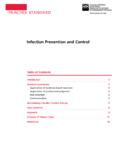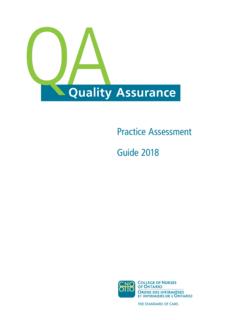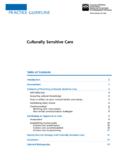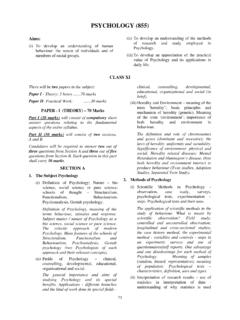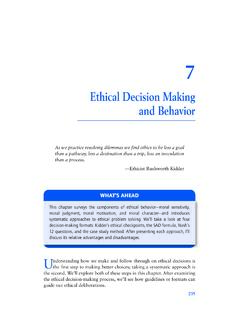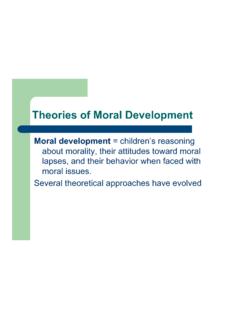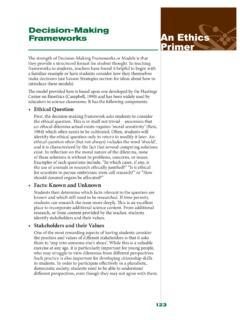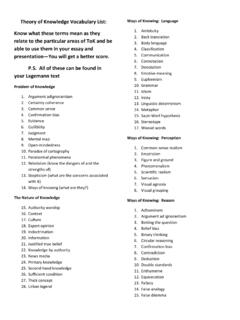Transcription of Competencies Entry -to -Prac tice - CNO
1 Entry -to -Prac ticeCompetenciesfor Registered Practical Nurses Revised: April 2019 Table of Contents ..Introduction 3 Purpose of the document3 Document background3 Assumptions 4 Definition of client4 Competency framework4 Competency statements5 Glossary 8 References 10 Acknowledgements The College of Nurses of Ontario thanks the nurses, educators and other stakeholders who participated in reviewing and revising this document. CNO also recognizes and thanks the Revisions of Entry -Level Competencies Working Group of the Canadian Council of Practical Nurse Regulators for the foundational work on Entry -to-practice Competencies . Entry -to-Practice Competencies for Ontario Registered Practical Nurses Pub. No. 41042 ISBN 978 -1-77116 -142-8 Copyright College of Nurses of Ontario, 2019.
2 Commercial or for-profit redistribution of this document in part or in whole is prohibited except with the written consent of CNO. This document may be reproduced in part or in whole for personal or educational use without permission, provided that: Due diligence is exercised in ensuring the accuracy of the materials reproduced; CNO is identified as the source; and The reproduction is not represented as an official version of the materials reproduced, nor as having been made in affiliation with, or with the endorsement of, CNO. First Published September 1999, revised June 2009, June 2011. Updated 2014 for Controlled Acts. Updated Feb 2018. Updated March 2018 for Controlled Acts. Revised April 2019 based on the National Competencies for RPNs in effect September 2020 title changed to Entry -to-Practice Competencies for Registered Practical Nurses.
3 Additional copies of this booklet may be obtained by contacting CNO s Customer Service Centre at 416 928 -0900 or toll-free in C anada at 1 800 387-5526 .College of Nurses of Ontario 101 Davenport Rd. Toronto ON M5R 3P1 2 College of Nurses of Ontario Entry -to-Practice Competencies for Registered Practical Nurses Introduction The College of Nurses of Ontario (CNO) is the regulatory body for nursing in Ontario. Through provincial government legislation (Nursing Act, 1991 and Regulated Health Professions Act, 1991), CNO is accountable for public protection by ensuring that nurses in Ontario practice safely, competently and ethically. CNO fulfills its mandate through a variety of regulatory activities, including the following: registration maintaining standards of nursing practice andeducation enforcing nursing standards conducting continuing competence reviews establishing Competencies required for Competencies are the foundation for nursing practice.
4 This document outlines the Competencies measured for Registered Practical Nurses (RPNs) upon initial registration with CNO and Entry to practice in Ontario. The Competencies also guide the assessment of nurses continuing competence for maintaining registration with CNO. Purpose of the document This document outlines the Entry -to-practice Competencies for practical nurses, organized by underlying assumptions for RPN practice and regulatory principles, which include professional practice, ethical practice, legal practice, foundations of practice and collaborative practice. The document is a guide to Entry -level practice expectations for RPNs in Ontario and includes a glossary of terms and references to help readers understand and interpret the document.
5 The Competencies for RPN practice at Entry level are established for the following purposes. Protection of the public: Through government legislation (Nursing Act, 1991 and Regulated Health Professions Act, 1991), CNO is mandated by the public to promote and ensure safe, competent and ethical nursing in Ontario. Practice reference: The Competencies assist RPNs in understanding Entry -level practice expectations and ongoing applications within their professional roles. Approval of nursing education programs: The Competencies are used by CNO in evaluating practical nursing education programs to ensure that the curriculum prepares graduates to successfully achieve professional practice standards before entering practice. Registration and membership requirements: CNO uses the Competencies to inform its decisions about registration eligibility.
6 Legal reference: The legal definition of nursing practice included in the Nursing Act, 1991 establishes the basis for the scope of practice in which any nurse may engage. The Competencies are the expectations for RPNs upon their Entry to practice in Ontario, and are used as a reference when evaluating the RPNs standard of care. Public information: The Competencies inform the public, employers and other health care providers about RPN practice, and assist with accurate expectations for RPN practice at Entry level. Continuing competence: In accordance with CNO s Quality Assurance Program, the Competencies are used by nurses annually when self-assessing their nursing practice and developing their professional learning goals. Document background Entry -to-practice Competencies for RPNs were first published by CNO in 1999.
7 Since then, CNO has regularly reviewed and revised the Competencies to ensure they remain relevant with current practices. In 2020, CNO will adopt these national Entry -to-practice Competencies for practical nurses. Consistency between jurisdictions supports the workforce mobility requirements of the Canadian Free Trade Agreement. In 2019, CNO worked as part of the Canadian Council of Practical Nurse Regulators to revise the national Entry -to-practice Competencies for practical nurses. A task force, comprised of representatives from jurisdictions that license, register or regulate RPNs across Canada (with Quebec as an observer), led the project. This document was validated by the RPN community and key stakeholder groups across Canada. College of Nurses of Ontario Entry -to-Practice Competencies for Registered Practical Nurses 3 The revised Competencies are based on resultsof an environmental scan, literature review and stakeholder consultation.
8 Each province s and territory s practical nurse regulatory body validates and approves the Entry -to-practice Competencies that apply within its jurisdiction. Each regulatory body also confirms that the Competencies are consistent with provincial and territorial legislation. CNO practice documents, including Professional Standards, Ethics and the Code of Conduct are expected to be used in Entry -level practice. Assumptions The following assumptions apply to the practice of practical nursing in Canada and to the Entry -to-practice Competencies included later in this document: The foundation of practical nursing is definedby: Entry -to-practice Competencies professional nursing standards of practice of theregulatory authority nursing code(s) of ethics and ethical standards scope of nursing practice applicable in thejurisdiction provincial, territorial and federal legislation andregulations that direct practice RPN practice is built upon the four concepts ofperson, environment, health and nursing, andis grounded within the context of the currentCanadian health care system, primary healthcare and emerging health trends RPNs possess Competencies that are transferableacross all areas of responsibility (for example,direct care, administration, education andresearch)
9 RPNs are active participants in healthpromotion, illness prevention and harmreduction activities RPNs practice in any setting or circumstancewhere health care is delivered Requisite skills and abilities are required toattain the RPN Entry -to-practice Competencies RPNs practice autonomously, safely, competentlyand ethically along the continuum of care insituations of health and illness across a client slifespan RPNs practice in situations of varyingcomplexity and work collaboratively with thehealth care team to maximize client outcomes RPNs demonstrate leadership by fostering continued self-growth to meet the challenges ofan evolving health care system RPNs follow a systematic approach to deliversafe, competent and ethical care by using thenursing process RPNs advocate for the implementation and useof evidence-informed of client The client is the central focus of practical nursing practice.
10 In the context of this document, client refers to a person who receives health care services from a nurse. In most circumstances, the client is an individual, but the client can include family members or substitute decision-makers. A client also can be a group, community or population. Competency framework The 79 Entry -level Competencies are organized in five categories: 1. professional of order of the categories and Competencies is not an indication of priority or importance. Bolded terms are defined in the Glossary. 4 College of Nurses of Ontario Entry -to-Practice Competencies for Registered Practical Nurses Competency statements1. Professional PracticeRegistered Practical Nurses (RPNs) adhereto practice standards. They are responsibleand accountable for safe, competent andethical nursing practice.
